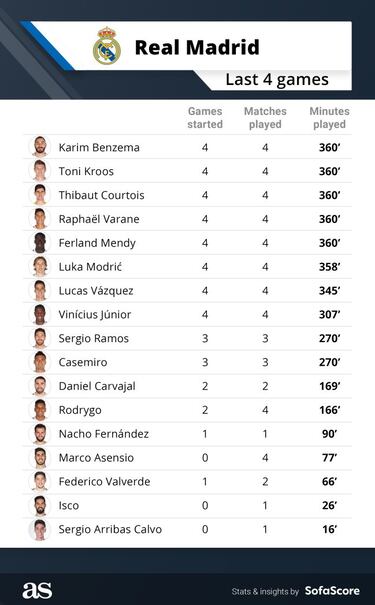Real Madrid: Celtic study backs up Zidane reluctance to rotate
Real Madrid have used just 14 starters in their recent run of wins - a policy supported by a 2010 research paper published by fitness coach Grégory Dupont.

When Zinedine Zidane returned as Real Madrid head coach in March 2019, he was in no doubt that Los Blancos needed freshening up both on and off the field. Among the changes he implemented in his backroom team was the arrival of Grégory Dupont that summer, the Frenchman replacing Antonio Pintus as Madrid’s fitness coach.
Dupont came highly recommended, with a CV that included helping France to victory at the 2018 World Cup. Initially, however, his methods were called into question, as Madrid suffered injury after injury during their 2019/20 pre-season preparations. A year and a half later, there are fewer doubts over the 48-year-old’s work.
Zidane moves away from rotation policy of first Real Madrid tenure
In his first spell as Bernabéu boss, Zidane led Madrid to a LaLiga title by turning regularly to a second-string side which, led by the likes of James Rodríguez and Álvaro Morata, performed every bit as well as his first-choice XI. During his second tenure, his attempts at repeating such a strategy have proved less successful - prompting him to share out game time between a much tighter nucleus of players.
The clearest indicator of that change of tack is the recent run of key fixtures played by Madrid. With pressure mounting after a series of adverse results, Los Merengues got their domestic and European campaigns firmly back on course with four wins in 11 days over Sevilla, Borussia Mönchengladbach, Atlético Madrid and Athletic Club - a sequence in which a group of just 14 players were used as starters.
Dupont study backs up Zidane's trust in small group of starters
And this lack of rotation is a strategy which, at least to an extent, is justified by the findings of a study conducted by Dupont just over a decade ago. Entitled “Effect of 2 soccer matches in a week on physical performance and injury rate”, its results were published in The American Journal of Sports Medicine in 2010, and back up Zidane’s decision to place his faith in a small cluster of players over the last fortnight.
Carried out together with five colleagues from the field of physical conditioning in sport, Dupont’s research offered up the following conclusion: "The recovery time between 2 matches, 72 to 96 hours, appears sufficient to maintain the [players'] level of physical performance". It’s a finding that in particular helps to explain the staying power shown by eight Real Madrid men - Thibaut Courtois, Raphaël Varane, Ferland Mendy, Toni Kroos, Luka Modric, Lucas Vázquez, Vinícius Júnior and Karim Benzema - who started all four matches.

Performance levels remain - but risk of injury greater
However, the study’s conclusion also warns that such a short recuperation period between matches "is not long enough to maintain a low injury rate", talking of a need for "improved recovery strategies to maintain a low injury rate among athletes during periods with congested match fixtures". In short, therefore, footballers' performance may not be affected, but their vulnerability to getting injured is.
As part of his research, Dupont and his colleagues monitored physical performance and injuries at Scottish club Celtic over the course of the 2007/08 and 2008/09 seasons, both of which saw the Glasgow giants juggle weekend league commitments with midweek Champions League games. In the 52 home matches Celtic played during the two campaigns, the data analysed in 32 players was: total distance covered, high-intensity distance, sprint distance and number of sprints.
As has already been established, the report showed that performance levels barely differed from one game to the next and, although it warns of the greater risk of injury, it gave advice on how to minimise the potentially harmful consequences of fatigue. It highlighted that players were most in danger of suffering physical damage in the final quarter of an hour of a match, and stated that a cold bath after every game and high-intensity training session - at around 15 degrees Celsius - served to aid recovery, in conjunction with the use of compression garments.
Nutrition is another of the points addressed by Dupont’s study, which found that a player’s diet in the hours before a game should chiefly revolve around fruit, vegetables and legumes - carbohydrates with a low glycemic index - while refuelling immediately post-match should focus on carbohydrates with a high glycemic index, such as shakes, soups, yoghurt and sandwiches.
Team behind on the scoreboard exposed to greater levels of fatigue
Related stories
A further conclusion drawn by the team of researchers is that the side that is ahead in a match is much better placed to moderate its physical exertions, even it doesn’t actually cover a much lower distance than its opposition. In other words, its players do less high-intensity running, which in turn helps to reduce the risk of injuries. This is most apparent in the second half, when the sense of urgency in the losing team becomes all the greater. In addition to avoiding having to chase the game, keeping possession for prolonged spells is an effective way of conserving energy and preventing physical complaints, the study adds.
Interestingly, Real Madrid never once fell behind in their last four games, a fact which Dupont’s research suggests will have bolstered Los Blancos’ ability to sidestep injuries. Since Zidane returned to the Bernabéu, his rotation policy has shifted to the point where he now makes the third-fewest changes to his line-up per game (3.69, behind only Elche’s Jorge Almirón and Getafe’s José Bordalás). It’s a deliberate course of action that Dupont looks to have had a major hand in.

